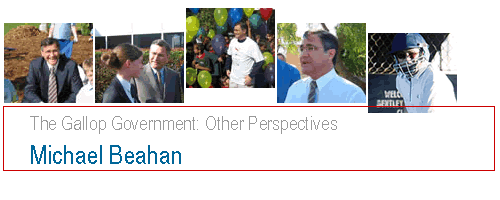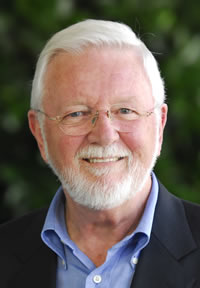
Michael Eamon Beahan was born and educated in London before migrating to Australia in 1954. After working as an electrical contractor he completed further studies at the University of WA and became the first education officer for the Trades and Labour Council. From 1981 to 1987 he was State Secretary of the Australian Labor party in WA. He represented WA in the Australian Senate from 1987 to 1996 and was President of the Senate from February 1994 until August 1996. In his post parliamentary career as a consultant he has provided strategic and political advice to business and the not-for-profit sector concerning their relationships with government.
I first met Geoff Gallop in the early 80’s shortly after his return from Oxford. As then State Secretary of the party I was warned that he had a reputation as a student radical with extreme left views. In fact he had, as a young man experimented with a number of political groupings, no doubt as a way of better understanding politics. The important fact is that he ended up in the Labor Party where he felt most comfortable. He became active in the party, did radio political commentaries and won election to Fremantle City Council. Despite the warnings, I came to respect him as an intelligent, energetic and balanced contributor to the Labor cause. I and others encouraged him to consider a political career and in 1986 I was happy to support his pre-selection for a by-election in the strong Labor seat of Victoria Park, vacated by the former Labor leader, Ron Davies. He won and retained the seat through successive elections and went on, as I always thought he would, to become a minister and Premier, making a significant contribution to the State.
Whatever one’s opinion of Western Australian Labor in the 1980’s, there is no doubt that it emerged from the Royal Commission in a severely weakened state and that this remained for some time a serious impediment to its attempt to return to the treasury benches. Perhaps Geoff Gallop’s most important and enduring legacy is in re-establishing the Labor brand, facilitating its return to government and creating a clean break from the negative image hobbling Labor in WA through the 90's. If there is one quality that emerges in any conversation about Geoff Gallop it is his unimpeachable integrity. It was this more than anything else which allowed the community to again take a chance with Labor. It was the application of this when in Government which broke the nexus with the 80's and re-established Labor as worthy of public trust.
Geoff Gallop was driven by a deep commitment to the public interest. A strong believer in due process, he insisted on its consistent application in all Government decision-making and by example and insistence set high standards for his Ministers and for his and their staff. He modelled a level of integrity and probity, which influenced his cabinets and the public service. He personally agonised over key decisions, often starting with a genuinely open-mind, but spending time seeking out the intellectual justifications for such decisions whilst eschewing deals and quick fixes. Those participating in this process invariably talk of his quick grasp of ideas, his ability to ask searching and incisive questions and his capacity to quickly absorb often technically complex briefs. Of course such punctiliousness in pursuit of the best solution in the public interest brought with it stresses and perhaps explain in part his early retirement from public life.
This insistence on due process was seen by some as a weakness and at times it certainly slowed the pace of decision-making, but such a view failed to recognise that this was more than offset by the fact that decisions once made were above reproach and that the process resulted in greater certainty at its conclusion.
Process driven he might have been, but Geoff Gallop was a social reformer with an impressive range of achievements for his relatively short period as Premier – whether in the area of environment, with tough decisions on Ningaloo Reef, the protection of old growth forests and the development of strong sustainability regulation, or in his firm commitment to ethnic communities or his Government’s achievements in electoral reform. While Jim McGinty rightly deserves credit for the achievement of one vote one value, it is doubtful that he could have won through without Geoff Gallop’s keen interest in electoral reform over many years and his strong support for his Attorney General’s actions against detractors inside and outside of Cabinet.
Geoff Gallop was also deceptively strong. As leader of the opposition he was almost alone among political leaders at the time of the referendum on a republic in 1999 in standing out for a directly elected president. This not only showed strength but also a keen insight into public attitudes. He was aware, before many of us, of the current reality that public support for a republic hinges on the promotion of a direct election model. Nothing less will be acceptable to a cynical electorate, supportive of the concept of a republic, but unwilling to delegate the selection of its titular head. He was equally strong and decisive in 2001, following WA’s driest winter in living memory in deciding to proceed with the building of a desalination plant. Advisers talk of the sharpness of his intellect in grasping the issues, of his astute quizzing of these advisers, and of his insistence on full information on all aspects of the issue before committing to the first such plant in Australia and working hard to garner the support necessary to make it a reality.
In many ways Geoff Gallop was not a typical politician. Preferring substance over spin, he saw good policy and good governance as the basis of good politics. He had a genuine humility of the ‘boy-from-the-bush’ variety, which was loved by the communities with whom he engaged. He brought to politics in WA a refreshing honesty and an absolute commitment to improving the lot of west Australians through the defence of the public interest and to finding sustainable solutions to intractable problems. While this was not always clearly understood, it was good for Western Australia and good for the Labor Party.
It is a fitting tribute to the standards he set and the belief system which drove him that, on leaving politics, he was offered and accepted the position of Professor and Director of Sydney University’s Graduate School of Management. I can think of no-one better equipped for this role.



